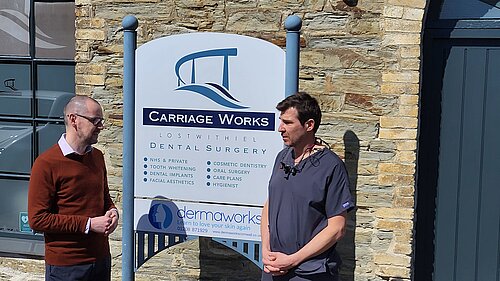Dentistry Recovery Plan is too little, too late

This week on the Radio 4 Today programme, Health Secretary Victoria Atkins said:
“There are some dentists who have NHS contracts but, for whatever reason, CHOOSE not to fulfil their NHS contract. They perhaps do a fraction of the full contract that is available to them.”
Well, if the Health Secretary thinks that dentists are simply CHOOSING not to fulfil their targets, then she clearly hasn’t met many NHS dentists. A full-time NHS dentist has to deliver around 30 “units of dental activity” (UDAs) each day to meet their annual quota. That could mean one check-up every 15 minutes for 7½ hours. For bigger jobs like multiple fillings or a root canal, they get three units, so they can afford about 45 minutes. But, on more complex cases, they can only claim for a maximum of 12 units of dental activity. So, if a patient needs more than three hours of work, it’s virtually impossible for the dentist to give them all the treatment they need without falling behind on their annual quota.
And the people who are most likely to need lots of treatment are new patients joining a practice after years on a waiting list, which is why virtually all remaining NHS dentists have closed their lists to new patients, including, apparently, the Cornish Dentist who got a surprise visit from Rishi Sunak yesterday.
A few weeks from now, dentists across the country are going to get letters from the NHS demanding “clawback” for failing to meet these impossible targets. Last year, thousands of dentists each had to pay back tens of thousands of pounds for failing to meet their UDA targets. Many of them took the hit in the expectation that a fairer system would follow this year.
The idea that this can be fixed by offering an extra £15-£50 to take on a new patient is just ludicrous. At best, it’s been designed by someone who has no idea what they’re talking about. At worst, it’s a cynical ploy to create a headline which says “We’ve provided funding for a million people to get off the waiting list”, safe in the knowledge that the actual number of people who benefit won’t be known until after the election.
What dentists really need is for the UDA targets and values to be adjusted so that they’re more realistic, like £40 for 25 minutes instead of £25 for 15 minutes. They should also be given one day per week where they’re simply paid by the hour to treat complex patients outside of the UDA system. These two simple measures wouldn’t cost a penny more than the current budget, but it would encourage the remaining NHS dentists to open their lists to new patients. It would also attract other dentists to sign new NHS contracts.
On Radio 4 this week, the Health Secretary said “Please don’t make the mistake of thinking the underspend therefore disappears into the ether.” She stated categorically “We have ringfenced this underspend”.
But last year, NHS England passed dental budgets to local “Integrated Care Boards”, many of whom are already in financial difficulties. When I spoke to the head of the Cornwall ICB two weeks ago, she told me she couldn’t use the underspend to adjust the UDA targets and values, because NHS England had told them to use the dentistry underspend to make up the shortfall in the wider NHS budget, and was actually incentivising them to do so by offering to wipe out historic deficits if they break even this year.
So, is Victoria Atkins deliberately lying, or does she just not know what’s going on in her own department?
Caption accompanying picture "Colin Martin has listened to local dentists to understand the real problems with the NHS contract"